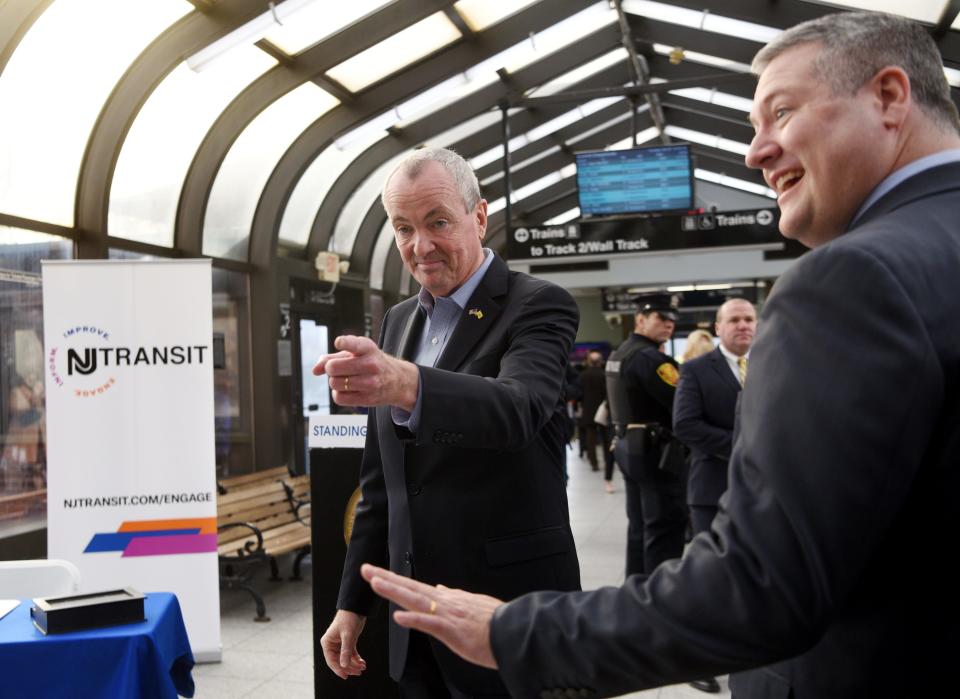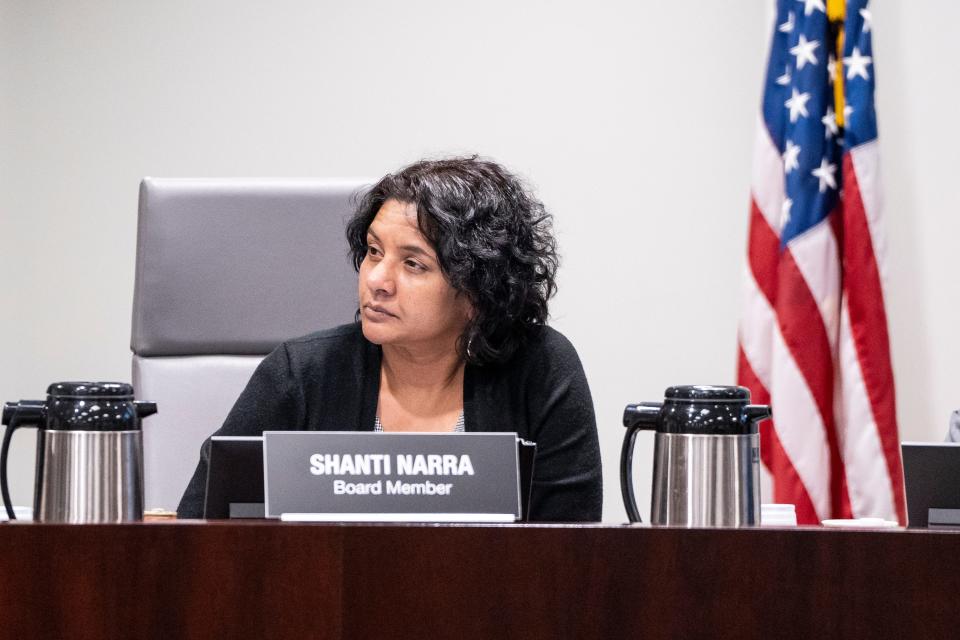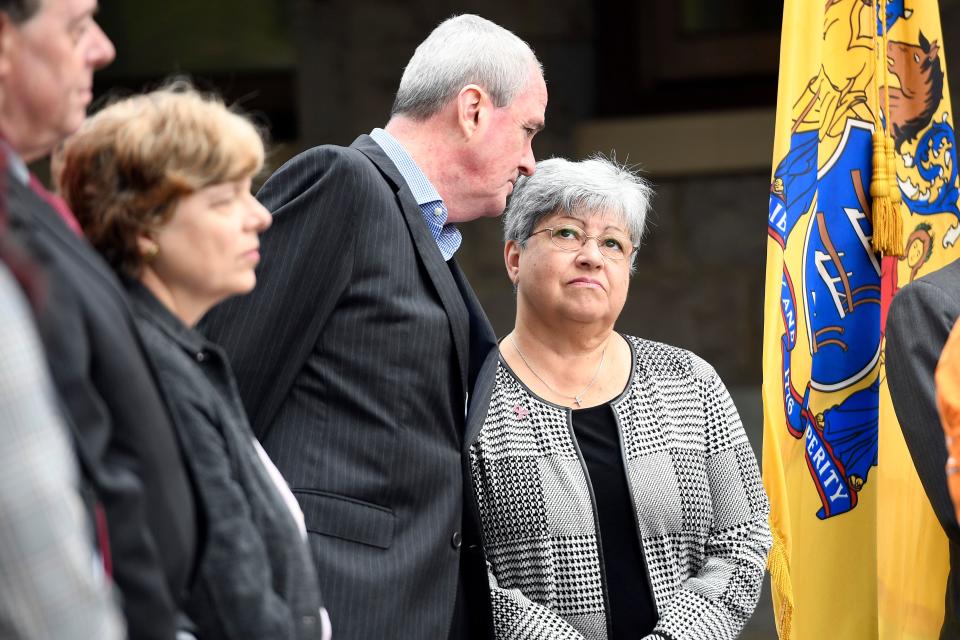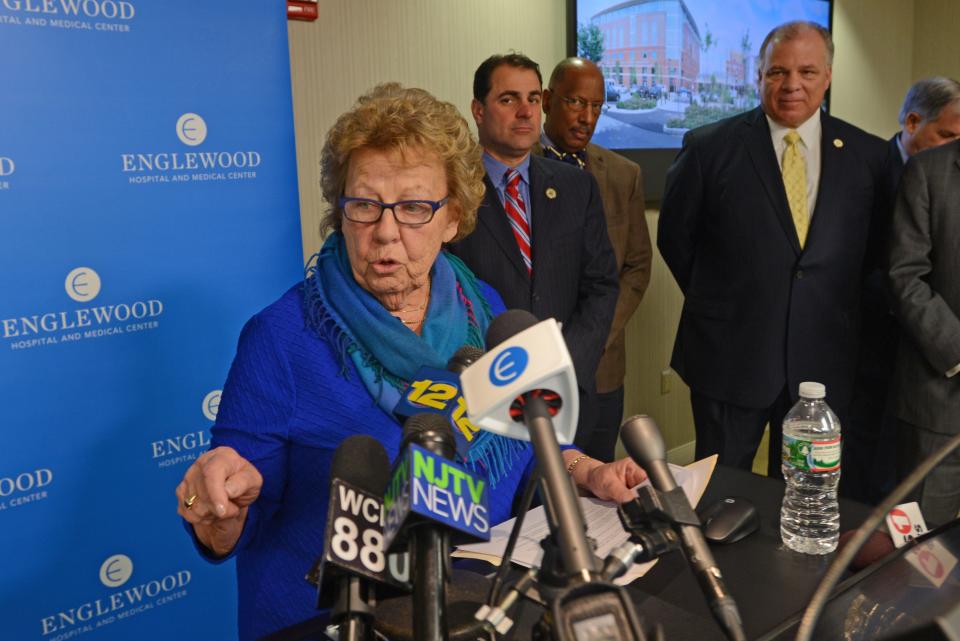Legislators tried to give NJ Transit board more teeth. But it seems largely defanged
- Oops!Something went wrong.Please try again later.
- Oops!Something went wrong.Please try again later.
The NJ Transit that Gov. Phil Murphy inherited in 2018 had experienced a deadly train crash a few years earlier. Meanwhile, a depleted roster of locomotive engineers had caused an unprecedented number of trains to be canceled.
The clock was ticking on a federally mandated safety braking system. And customers had grown more frustrated after facing two fare hikes of 22% and 9% during the prior administration — even as performance declined.
Yet key players who enacted a law five years ago to reform the agency and provide more oversight have widely divergent opinions about how successful it has been.
The primary author of the NJ Transit Reform Law of 2018, Loretta Weinberg, didn’t give a glowing review.
Story continues below photo gallery.
“Mostly not the success we’d hoped for,” Weinberg told NorthJersey.com recently.
“The board doesn’t seem to be as independent as we’d hoped it would be, and the voices of independence are no longer there, which is a result of not wanting them there," Weinberg said. "And that’s a disappointment to me.”
Murphy doesn’t see it that way.
"NJ Transit has become more efficient and more accessible, transforming into a world-class public transportation system that prioritizes customer experience and reliability," said Bailey Lawrence, a spokesman in the Murphy administration. “The agency has become considerably more transparent and receptive to the concerns and needs of riders.”
Lawrence declined to comment on the status of the law's mandated customer advocate role but touted several improvements at the board level — including more meetings with more detailed information for riders about what is affecting their commute, and posting meeting materials online.
Many initiatives, more transparency
The legislation included numerous initiatives that NJ Transit — the nation's third-largest provider of public transportation — had to implement.
Many of those have been done, including filing new annual reports, making a list of real estate holdings and staffing its board committees. The agency has also gone beyond the law's mandates by adding a new committee that is not required, giving the public a week's notice on meeting agenda items and offering in-person and digital access to meetings.
"Since the beginning of this administration, the agency has and continues to be accountable and transparent, meeting all statutory reporting requirements," said NJ Transit spokesman Jim Smith.

But the mandates for new hires and appointments have fallen woefully short of the reform law’s expectations, Weinberg said. The law has never been fully implemented in the five years since Murphy signed it Dec. 20, 2018.
“The bureaucracy always interfered because … the bureaucracy is always afraid to give up any power,” said Weinberg, of Teaneck, the former Senate majority leader who served in the Legislature for 30 years before retiring in 2022.
What of the customer advocate position?
The most glaring void is the much-anticipated customer advocate, a role mandated by the reform law that has been vacant for more than three years despite an outcry from riders and legislators.
Even when the role was filled by Stewart Mader from April 2019 to October 2020, reports later came out that what he had applied to be was “chief spokesperson” for the agency. Mader’s reports to the board were criticized for including only positive news, not issues facing riders.
Since Mader left, NJ Transit has made at least three attempts to replace him. The most recent was led by board member Shanti Narra, who until September gave regular updates about the status of that hiring process.

“There are several interviews being scheduled, and we’re moving along with the process,” Narra said in September. She has not provided a public update since then.
Where things stand now
Diane Gutierrez-Scaccetti, the former chair of the board and commissioner of the Department of Transportation, indicated at her last NJ Transit board meeting, on Dec. 12, that the agency has not found applicants fit for the job.
“I know the customer advocate is of utmost importance, and it is to this board as well," Gutierrez-Scaccetti said. "To be honest, we get many, many resumes in response to that particular position, but they’re not advocates by any stretch of the imagination.”
Gutierrez-Scaccetti left her role as commissioner to become Murphy’s chief of staff full time on Jan. 12.

Smith said the agency reviewed hundreds of resumes and that most “did not have the level of customer service and leadership experience commensurate with the role and responsibilities of the position.”
He added: “Staff is finalizing the interview process, which includes narrowing down the list to the viable candidates." Then, the viable candidates will be presented to the board and they will choose the next customer advocate.
"Our commitment to finding qualified individuals for this position remains unwavering, and as such we have been extremely deliberative in our approach to finding the right candidate to represent the agency for such a critical public-facing role," Smith said.
But one person who interviewed for the customer advocate role — and withdrew after hearing Gutierrez-Scaccetti’s remarks — says the process appeared to have stalled without explanation around the time Narra made her last public comment on the matter.
Michael Phelan applied for the customer advocate role in May, interviewed with an NJ Transit representative in August and did a second round of interviews in September with Justin Davis, the chief of staff; Anthony Grieco, the senior vice president of communications and customer experience; and Glenn Shuster, chief of human resources.
After that, Phelan inquired twice about the status of the job and was told there was no update.
If Gutierrez-Scaccetti is "saying they’re incapable of finding someone, that’s really disappointing, because it’s either a lie or they weren’t really trying,” said Phelan, whose experience includes doing community relations for the Port Authority of New York and New Jersey for the midtown bus terminal replacement project, and working at Metro-North as assistant chief officer of human resources and administration.
He also commuted on NJ Transit for 15 years.
"I may not meet their needs, and that’s fine, but the fact that there’s no updates ... if it were something the agency would want to get done, it would have gotten done before she left," Phelan said, referring to Gutierrez-Scaccetti.
Competing for customer experience talent
There have been concerted efforts to improve the customer experience at NJ Transit, and the agency has long tracked those experiences through customer satisfaction surveys. The agency received a 6.9 rating last spring, the highest overall customer satisfaction rating since the surveys began in 2011.
Among the improvements, which have taken place under the direction of Grieco — whose title, since 2019, has included “customer experience” — are:
Expanded tech offerings, including apps that include real-time departure information about buses and trains, a “How full is my ride” feature, and online payment options and scheduling for Access Link users.
Streamlined updates on social media accounts about all of NJ Transit's modes of travel when there are delays, cancellations, detours and other commute disruptions.
Feedback included in board committee presentations about the biggest customer service complaints of that given month.
A pilot program that supplements Access Link service with rides from ride-share providers, including Lyft and Uber.
Performance data made available for every mode of transportation on NJ Transit’s website.
But some customers still say they have trouble getting through to the agency about problems, such as the parent of a developmentally disabled Access Link customer stranded on a bus in May, or the NJ Transit customers who raised issues about real-time departure information that was temporarily unavailable on third-party apps.
Prioritizing the customer experience is a focus of transit agencies around the country, including WMATA in Washington, MARTA in Atlanta and Sound Transit in Seattle — and no two agencies address the issue the same way.
LA Metro’s board passed a resolution in 2018 to establish a customer experience program, and Aaron Weinstein — who worked for 32 years at Bay Area Rapid Transit — became the program’s inaugural leader.
The job is a delicate balance that includes “treating the internal stakeholders with respect because of their expertise, but at the same time I was hired to be a change agent, and that requires a certain amount of gumption to really always bring people back to the customer,” Weinstein said.
While at LA Metro, he helped the agency produce customer experience reports, which have become annual, grew the department to eight people during his tenure and made more than $200 million in investments to improve the day-to-day lives of riders.
Weinstein left LA Metro in 2022 to launch a consulting service, Transit CX, that helps transit executives develop customer experience programs.
“It’s a difficult position to hire. It’s helpful to have someone that has been in transit so that they can be credible in that environment, and they know service planning and fare technology and all of the things that over many decades you build up a knowledge of,” he said, adding that customer experience is a growing field outside of transportation.
“There are lots of organizations that cater to both government and private sector clients" on customer experience, he said, "and everyone’s competing to get talent. It’s a tough time to get the right people.”
'They do have the power to speak up'
At NJ Transit, establishing a full roster of board members is another unfinished element of the reform law.
The law increased the size of the board from eight members to 13, requiring some appointees to have ridership or industry experience, and added other non-voting members to increase union representation.
Weinberg hoped this would give the agency some needed oversight — and when the first new slate of board members joined in 2020 it began to show signs of doing just that.

Controversial contracts were pulled from the agenda or voted down, nay votes were cast because of budget concerns, questions were raised during public meetings about holding private bus carriers accountable and the need for more sustainable funding resources, and calls were made for more board input on significant agency decisions.
“They represented what we in the Legislature thought that law was going to accomplish,” Weinberg said.
But in the last year alone, three of the most outspoken board members have gone.
One was replaced by Murphy. The vice chair resigned after voicing concerns about the agency’s fiscal health, a lack of board involvement and a disputed lease for a new headquarters building. The third, who also helped draft the reform law while in the Legislature, finished his term and left after accepting a new job.
And in the past year, the board's watchdog activity has softened in public meetings, with fewer questions for staff and with unanimous approval of agenda items.
There are now two vacancies on the board that Murphy must fill and another that is expiring near the end of this month. Plus, no successor has been named to replace Gutierrez-Scaccetti as commissioner of the Department of Transportation, which includes chairing NJ Transit.
Weinberg urged those still on the board to step up.
“We saw some great voices lost on that board," she said. "But there is a board — they do have the power to speak up and speak out, and that’s their choice as commissioners.”
Taking over the family transit business
Board reformation is not unique to NJ Transit.
Robert Cruickshank, a transit advocate and chair of Seattle’s Sierra Club, recently wrote an op-ed criticizing the overreach of Sound Transit’s board, largely made up of elected officials from the counties in the Seattle area.
“You want a board that is empowered to look at the nitty-gritty details but also recognizes that there is a difference between meddling to appease donors or appease for the wrong reasons and providing oversight to ensure things are done in a timely and cost-effective way,” Cruickshank said.
“The only way that transit rider … is going to have their needs represented is to know that the people running the transit system have their best interest in mind,” he said.
Brittney Kohler, legislative director of transportation and infrastructure services for the National League of Cities, likened becoming a transit board member to someone taking over the family business. They’re tasked with taking care of an aging asset the community has come to depend on while figuring out how to modernize.
“You really have to put in the heart, and the heart has to be both standing up for what is right, serving the customer well, but also being very financially accountable for the decisions that you make,” Kohler said.
Their role, especially given the post-COVID fiscal cliffs that agencies including NJ Transit now face, is not easy.
“It’s rare that a board is not asking questions," Kohler said. "We all learn from the question-and-answer process, and we want to continue to see those who are appointed to those positions really looking toward the future of the decisions that are being laid out for them.
“Board members who sit down to work on transit for the next few years — that is going to be a tough job," Kohler said. "And it is one they should walk into with eyes wide open and a commitment to the public to protect the transit service that many, many generations of New Jersey residents have invested in.”
This article originally appeared on NorthJersey.com: Efforts to give NJ Transit board more teeth appear derailed

